- Joined
- Apr 24, 2017
- Messages
- 36,766
- Reaction score
- 109,711
Follow along with the video below to see how to install our site as a web app on your home screen.

Note: This feature currently requires accessing the site using the built-in Safari browser.
Level limits for the fighter class(es) kind of make sense since all of the demihuman races (including, in 1E, half-orcs) are smaller than humans and have lower maximum strength, so it seems reasonable they’d have a lower maximum hp cap, and the smaller the race the lower the cap (halflings and gnomes severely limited, elves and half-elves less so, dwarfs and half-orcs barely limited at all). That said, there’s no real reason they couldn’t continue to improve their attacks and saving throws even if they’re no longer gaining hit points (which BECMI sort of did with its Attack Ranks kludge).
Level limits for demihuman spell casters are harder to justify, and it’s really just a taste/flavor preference that Gygax wanted the highest level spells reserved to humans and for demihumans to exist in a secondary or supporting role - that they’re better for casual or younger players since they have a lot of “instant gratification” special abilities that are most useful at low levels, but the more serious and strategic-minded players who are thinking in the long term would (presumably) forego those shiny trinket abilities in exchange for unlimited potential.
It didn’t really work out that way (especially as the level limits kept being increased from OD&D to Greyhawk to AD&D to Unearthed Arcana to 2E to the point where most campaigns were never going to reach levels where they became relevant) and probably should have instead been dropped and replaced with something like requiring demihuman characters to earn 1.5 or 2x as many XP to level up as humans (alongside a maximum HD cap), which IIRC was presented as an optional rule in 2E.
I suspect they would’ve gotten there eventually even if Gary remained in charge longer (he was a LOT less wedded to the cobbled-together sacred cows of the 1E rules than a lot of the modern-day 1E grognards).
There are class / level based games that do manage to make this work, but the best examples I can come up with are Role Master and MERP which has... ummm, skills.
I actually like the concept of proficiencies (ok, this also really is a skill system), and feats. The implementation has not always been the best, but it I thought it was a significant improvement.
Well, it worksView attachment 70121
Here it is in Gary’s own words from Europa 6-8 page 20, April of 1975. There may be more elegant solutions today, like not giving demi-humans any special in game abilities, but Gygax was literally writing the book on this stuff. Monday morning quarterbacking should to take that into account.
 !
!In the PF2 game I'd joined, the majority of PCs are humans, with a couple that might be either elves or half-elves, IDK.Even more modern systems, like Pathfinder, typically see all non human parties so the problem of how to encourage a human centric game hasn’t gone away.
I always wanted to reskin the Cleric class into being the Elf. That way Elven magic would be as presented in Tolkien and different from human magic. I would probably remove the blunt weapon restriction and replace it with a metal armour and shield restriction.The one that always bothered me was the apparent idea that humans were better at magic than freakin' elves.
I don't like demihuman level caps but it's not a hill I'd die on. I think just capping levels for everyone at 10 or whatever, as in Beyond the Wall, is the better idea.
I also have it on Tabletop Simulator. I remember running it for some friends on there digitally, while having the real reference cards in front of me. It was super handy, actually.I had that boxed set. I always liked the DM screen with the reference sheets tucked in.
Nah, level caps should be done by product. You're losing the valuable elf player market if they can't benefit from the new Lvl 40-50 book!
Which is also why "name level" 9 makes no economic sense. Way too early to retire! We have to postpone the Peter Principle and sell more Epic Adventuring Books! ("Fighting-Men in Heck" books sell more than "1001 ways to spruce up your stronghold")
+15% XP Bonus for playing a human seems to do the trick in classic editions.Even more modern systems, like Pathfinder, typically see all non human parties so the problem of how to encourage a human centric game hasn’t gone away.
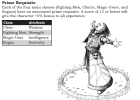
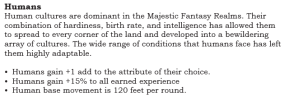
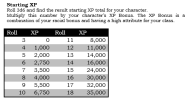
I've issues, personally with characters who have rolled well, or exceptionally well getting another benefit beyond the high scores (like XP bonuses) it seems biased to me and opposes letting people play what they roll even if not great, where they SHOULD be rewarded. Hence I'd give the bonus XP to those with lower stats (say 12 or less in their character class requisite.)+15% XP Bonus for playing a human seems to do the trick in classic editions.
This
View attachment 70222
Plus
View attachment 70223
First started doing in 2012 and in the half-dozen campaigns along with several one-shot where I allowed character generation the party composition dramatically shifted to being human dominated. For one shot I allow for a varying levels by having players roll for starting XP on this chart.
View attachment 70227
Humans with a high prime requiste would get +20% starting XP using this. Also shifted the composition of the party to being human dominated.
For D&D 5e, not allowing feats but allowing the variant Human race package with it's one feat also works nicely. The XP Bonus incentive appears not to work as well for 5e players.
Human, Variant
Both setups have been successfully tested with player who mostly roleplay and players who mostly powergame.
- Ability Score Increase. Two different ability scores of your choice increase by 1.
- Skills. You gain proficiency in one skill of your choice.
- Feat. You gain one Feat of your choice.
That's a keen idea. I really like it.I've issues, personally with characters who have rolled well, or exceptionally well getting another benefit beyond the high scores (like XP bonuses) it seems biased to me and opposes letting people play what they roll even if not great, where they SHOULD be rewarded. Hence I'd give the bonus XP to those with lower stats (say 12 or less in their character class requisite.)
Sure however keep in mind that the +5% XP bonus for Prime Requisites is basically worthless. (or even +10%)I've issues, personally with characters who have rolled well, or exceptionally well getting another benefit beyond the high scores (like XP bonuses) it seems biased to me and opposes letting people play what they roll even if not great, where they SHOULD be rewarded. Hence I'd give the bonus XP to those with lower stats (say 12 or less in their character class requisite.)
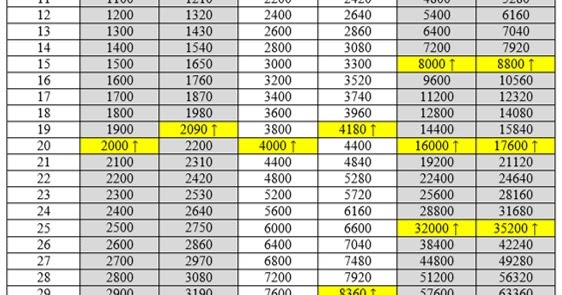
So it seems that unless a) you play with a really slow level progression or b) you get to higher level play where the XP requirements flatten out, a 10% XP bonus will have no appreciable effect on game play.
That is accurate, but it also assumes that the original design of demihumans was supposed to be completely fair an even compared to humans at ever level and in ever instance, which simply wasn't the case. When the reality of not playing to max level sunk in Humans started to look a little blah, and many (many) fantasy games since have done nothing to address the issue.But doesn’t the fact you have to bribe people to play humans in a human centric game seem wrong and speak to the problems with demi-humans in the first place?
I've issues, personally with characters who have rolled well, or exceptionally well getting another benefit beyond the high scores (like XP bonuses) it seems biased to me and opposes letting people play what they roll even if not great, where they SHOULD be rewarded. Hence I'd give the bonus XP to those with lower stats (say 12 or less in their character class requisite.)
I'm not sure that a throw away comment like those with less natural ability have to work harder (just to pick something) is any more or less metagamey than rewarding high scores simply for being high. Personal taste I suspect.Rewarding low stats annoys me. I get it from a game balance perspective, but it is super metagamey, there being no in game reason to explain it. Although it also has no in game explanation, I would not have the same reaction to something that tied starting money / gear to stat totals thereby giving lower starting stats a bit of a bonus up front.
I will note I have no issue with, "just roll up another set, those stats suck", so do not believe in the idea that you just play what you rolled. Some characters were born (rolled) to be the NPC serving you grog at the tavern.
Another way of wording my thoughts... In Cold Iron I used to joke about +1 farmers (a character that maybe amounted to +1 attribute bonus among the 3 physical attributes). I've been working on the combination of dice to more consistently roll up decent characters. I look to a character being able to reach absolutely at least +8 if not +10 between STR and DEX for a fighter. A spell caster needs to reach that between INT or WIS and WIL. A character who will be more of a fighter/caster can land more in the middle.Rewarding low stats annoys me. I get it from a game balance perspective, but it is super metagamey, there being no in game reason to explain it. Although it also has no in game explanation, I would not have the same reaction to something that tied starting money / gear to stat totals thereby giving lower starting stats a bit of a bonus up front.
I will note I have no issue with, "just roll up another set, those stats suck", so do not believe in the idea that you just play what you rolled. Some characters were born (rolled) to be the NPC serving you grog at the tavern.
Why? If we consider attributes to be some kind of measure of natural talent, don't people in real life follow a path they have natural talent for? Now sure, some folks maybe don't seem to have any natural talent, though actually I suspect that really isn't the case. Now maybe there's an argument that most of what we attribute to natural talent is actually just environmental, what did your family encourage? What did you need to excel at to do well in the household and neighborhood you grew up in? But maybe all of that is still what we're rolling for when we roll attributes.I'm not sure that a throw away comment like those with less natural ability have to work harder (just to pick something) is any more or less metagamey than rewarding high scores simply for being high. Personal taste I suspect.
Natural talent as it might relate to a class doesn't seem like an idea that can be captured or adequately explained by a single high stat, especially the physical stats. That's much like saying that natural physical talent guarantees success in a sport, which is obviously not true. It might indicate basic aptitude, but not so much success and development over time.Why? If we consider attributes to be some kind of measure of natural talent, don't people in real life follow a path they have natural talent for? Now sure, some folks maybe don't seem to have any natural talent, though actually I suspect that really isn't the case. Now maybe there's an argument that most of what we attribute to natural talent is actually just environmental, what did your family encourage? What did you need to excel at to do well in the household and neighborhood you grew up in? But maybe all of that is still what we're rolling for when we roll attributes.
I don't see a problem with demi-humans.But doesn’t the fact you have to bribe people to play humans in a human centric game seem wrong and speak to the problems with demi-humans in the first place?
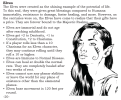
There is a psychological impact even when it is just +5%. Something I learned when I played different modifiers for the Human XP bonus.I get that a 5% or 10% XP bonus doesn't amount to much, but it maybe creates some incentive to play a class your attributes are more suited for, though maybe players would do that anyway.
I tend to run D&D 5e more by the book but still roleplay the different races the same I do in GURPS or classic D&D. One 5e campaign I ran was pretty human centric due to where the group wanted to start out in the Majestic Wilderalnds. But one player wanted to play an Elf. So I warned him that he will be treated pretty much as a "rock star" wherever he goes in the realm. I stressed Just like a rock star which also includes the extreme negative reactions folks have when the rock star doesn't conform to expectations. He said "yah I got it". But over time he grew weary of the attention his character was getting and finally decided to make a new human character so he could be more chill on his adventures.It would be interesting to understand all the whys of players choosing to play mostly humans in my campaigns. For Glorantha, it's probably the reputation of dwarves and elves as being weird (though I've decided to make my Gloranthan dwarves NOT weird...). The other non-human races are definitely weird. That weirdness also goes with less fitting in with the dominant human society.
No, it suggests that there's a problem with racial balance in general. If all the demi-humans are popular and humans are not, it's most likely to be easier and less fun-diminishing to buff humans rather than nerfing demi-humans (and having to get the balance right for each and every nerf).But doesn’t the fact you have to bribe people to play humans in a human centric game seem wrong and speak to the problems with demi-humans in the first place?
Although to be clear you aren’t hitting them with a nerf hammer when they were created nerfed by level capsNo, it suggests that there's a problem with racial balance in general. If all the demi-humans are popular and humans are not, it's most likely to be easier and less fun-diminishing to buff humans rather than nerfing demi-humans (and having to get the balance right for each and every nerf).
If it's not that 'humans are unpopular' as 'everyone plays an elf', then elfes are the problem and the easiest solution is to hit the elfs with a nerfhammer.

The multiclass vs dual class decision is an interesting one.My big thing with playing demihumans in AD&D wasn't infravision or all the ridiculous little ribbons most non-humans get, it was the ability to multiclass. If humans could have multiclassed in AD&D, I would have played a lot fewer demihumans and a lot fewer Player's Option "Priests".
Why all of the rolling of dice? Why not have players choose class, have attributes set to what you think is a reasonable minimum, plus a d6 or whatever? Or do point buy? Seems like there is this thing where people wanna roll attributes, expect them to all be above average for a class as a bare minimum to be "viable for play" or whatever, and maintain this "Welp, I just rolled this well naturally, and that makes my character a big damned hero" feeling. Or this weird sense of "balance" that is in conflict with some sense of "realistic" that continually runs up against this "Oh, its not fair, this fighter has a 13 STR!" thing. Like, do you wanna model some kind of realistic-seeming variation of attributes using randomization, or do you not? It's literally impossible to do both the random "natural distribution of capabilities" thing and the balanced (but I'm also bad-ass superior to most folks when doing my schtick) thing that is apparently being sought at the same time. At least given the rules base being talked about.Another way of wording my thoughts... In Cold Iron I used to joke about +1 farmers (a character that maybe amounted to +1 attribute bonus among the 3 physical attributes). I've been working on the combination of dice to more consistently roll up decent characters. I look to a character being able to reach absolutely at least +8 if not +10 between STR and DEX for a fighter. A spell caster needs to reach that between INT or WIS and WIL. A character who will be more of a fighter/caster can land more in the middle.
I did actually at one time propose a point buy for Cold Iron. On the surface it looked good, though I never play tested it. The problem with introducing a little randomness (pick class, take base attributes, randomize them a bit) is finding a good randomizer. I find 4d6k3 rolled a bunch of times does well for randomness. One thing that's hard to randomize in Cold Iron is the impact of attributes having a 3-18 base and then an addition 1-6 added as a potential they can reach. So an 18/20 plays differently than a 14/20. Also, if you actually roll an 18, you can roll all 3 d6 again, and each 6 bumps your 18 up one and then you get to roll that d6 again (and technically if you roll 4 sixes on 4d6k3 you get to roll all 4 of those d6 looking for 6s - I don't know that I've EVER had anyone do that).Why all of the rolling of dice? Why not have players choose class, have attributes set to what you think is a reasonable minimum, plus a d6 or whatever? Or do point buy? Seems like there is this thing where people wanna roll attributes, expect them to all be above average for a class as a bare minimum to be "viable for play" or whatever, and maintain this "Welp, I just rolled this well naturally, and that makes my character a big damned hero" feeling. Or this weird sense of "balance" that is in conflict with some sense of "realistic" that continually runs up against this "Oh, its not fair, this fighter has a 13 STR!" thing. Like, do you wanna model some kind of realistic-seeming variation of attributes using randomization, or do you not? It's literally impossible to do both the random "natural distribution of capabilities" thing and the balanced (but I'm also bad-ass superior to most folks when doing my schtick) thing that is apparently being sought at the same time. At least given the rules base being talked about.
If a game does not generate characters players want to play, then either the players are playing the wrong game for them, or the game has broken chargen. Like, if you need to waste your time rolling up multiple attribute sets, I kinda feel that is dumb and shouldn't happen. Is this a bad opinion?
I don't allow multi-classing in my Majestic Fantasy RPG. However what I do is the following.My big thing with playing demihumans in AD&D wasn't infravision or all the ridiculous little ribbons most non-humans get, it was the ability to multiclass. If humans could have multiclassed in AD&D, I would have played a lot fewer demihumans and a lot fewer Player's Option "Priests".
Why all of the rolling of dice? Why not have players choose class, have attributes set to what you think is a reasonable minimum, plus a d6 or whatever? Or do point buy? Seems like there is this thing where people wanna roll attributes, expect them to all be above average for a class as a bare minimum to be "viable for play" or whatever, and maintain this "Welp, I just rolled this well naturally, and that makes my character a big damned hero" feeling. Or this weird sense of "balance" that is in conflict with some sense of "realistic" that continually runs up against this "Oh, its not fair, this fighter has a 13 STR!" thing. Like, do you wanna model some kind of realistic-seeming variation of attributes using randomization, or do you not? It's literally impossible to do both the random "natural distribution of capabilities" thing and the balanced (but I'm also bad-ass superior to most folks when doing my schtick) thing that is apparently being sought at the same time. At least given the rules base being talked about.
If a game does not generate characters players want to play, then either the players are playing the wrong game for them, or the game has broken chargen. Like, if you need to waste your time rolling up multiple attribute sets, I kinda feel that is dumb and shouldn't happen. Is this a bad opinion?
Natural talent as it might relate to a class doesn't seem like an idea that can be captured or adequately explained by a single high stat, especially the physical stats. That's much like saying that natural physical talent guarantees success in a sport, which is obviously not true. It might indicate basic aptitude, but not so much success and development over time.
I think both options discussed are pretty metagamey btw, but I don't think one is obviously more naturalistic than the other.
I don't allow multi-classing in my Majestic Fantasy RPG. However what I do is the following.
Have a skill system that allows players to make their character better at things outside of spellcasting and combat regardless of class. The "rogue" classes focus on being better at things outside of spellcasting and combat. This takes care of some of the reasons why players want to multi-class.
I have a lot more classes that are grounded in how the setting works and thus make more sense. For example, the Montebank is in essence a magic-user/thief multi-classed character. Montebanks are "street" mages so they have more non-combat/non-magic skills than magic users but are weak spellcasters due to their informal training.
if a player made a good case for an elven/human/dwarven/etc. profession that is in essence a fighter/magic-user I would make a class for that would be grounded in how my Majestic Fantasy Realms works.
In Cold Iron everyone is multi-classed. But ultimately that's because Cold Iron really is skill based, but it utilizes character class to attain some things that don't work well with skill based or power based (Hero system for example). Cold Iron has escalating hit points, so a Fighter Level is the easiest way to work those, and then spells divided into levels with a Magic Level granting access to higher level spells is the easiest way to work that. Sure, GURPS restricts access to the more powerful spells with prerequisites, but I actually prefer a general spell level rather than it being not too costly to max out in one particular spell tree. There are other benefits such as spacing out attribute improvements, granting some special abilities, spell casting time, and spell success to name some. Magic has more parameters that increase with level, which Fighter grants enough skill points to have 5 combat skills at level. To round things out, I added Expertise Level to cover all the non-combat skill stuff.I don't allow multi-classing in my Majestic Fantasy RPG. However what I do is the following.
Have a skill system that allows players to make their character better at things outside of spellcasting and combat regardless of class. The "rogue" classes focus on being better at things outside of spellcasting and combat. This takes care of some of the reasons why players want to multi-class.
I have a lot more classes that are grounded in how the setting works and thus make more sense. For example, the Montebank is in essence a magic-user/thief multi-classed character. Montebanks are "street" mages so they have more non-combat/non-magic skills than magic users but are weak spellcasters due to their informal training.
if a player made a good case for an elven/human/dwarven/etc. profession that is in essence a fighter/magic-user I would make a class for that would be grounded in how my Majestic Fantasy Realms works.
I think you misreadI like this better than the usual multi-class or create a new class (leading to dozens of classes) that seems to be the current favorite.
So much can be done just by making "class abilities" options, so you can create that thief who also fights well, so they trades off some thief ability to roll attacks as a cleric. On the other end maybe they just want a sneaky fighter so they trade off the ability to wear heavy armor to gain move quietly and hide in shadows. This becomes an easy way to add lots of "character classes" without actually adding any. Many new classes are simply like college degrees with a major and a minor field of study vs a full dual major (multi-class). Paladin was a fighter major with a cleric minor, and the Ranger is a Fighter major with a druid minor.
I've seen this kind of thing used (RM/MERP sort of) but it is not as common as I think it should be if you want to stick with class / levels.
I'm not talking about having super 'low' stats, just one closer to the minimum to be the class. Then again I preferred D&D having stat minimums to some degree.I get that a 5% or 10% XP bonus doesn't amount to much, but it maybe creates some incentive to play a class your attributes are more suited for, though maybe players would do that anyway. I don't expect a player to play a PC that doesn't have at least one decent attribute. Where I see the "role playing challenge" is in playing a PC that has a particularly poor secondary attribute. I also definitely feel like we shouldn't be encouraging or expecting players to choose a class where the prime requisite is below average. I think the STR 13, INT 6 Magic User is silly.
It would be interesting to understand all the whys of players choosing to play mostly humans in my campaigns. For Glorantha, it's probably the reputation of dwarves and elves as being weird (though I've decided to make my Gloranthan dwarves NOT weird...). The other non-human races are definitely weird. That weirdness also goes with less fitting in with the dominant human society.
It's less obvious in Cold Iron where the elves and dwarves aren't any more weird than D&D elves and dwarves. Oh, and I didn't mention the race makeup of my Cold Iron Blackmarsh campaign. The play by post had an elf. The current campaign had a goblin (player has dropped out, the PC is going to hang in the background until the next time they're in town) and has a halfling. Otherwise all human.
While AD&D had most stats doing bugger-all when under 15 (unless you were a spell caster, then your Int or Wis mattered a lot more), B/X, etc. had them matter from 13+ and 8-, which I always thought was much more sensible (probably because RQ2 did that, and that was my introduction to stat modifiers).Really comes down to if stats don't matter, then why even have stats? In older editions of D&D where pretty much anything between 8 and 16 did practically nothing they very well could have just had a 4 stats bad (1), average (2-5), above average (6) and AWESOME!!!!! (roll a 6, then roll a second 6, and then properly perform the secret GM handshake, wash his car and buy him a pizza). The fact there were what 5 or 6 classes of 18 (already just a 1-2% chance of rolling) just fries my brain.
I think this really goes back to D&Ds wargaming roots where the initial concept of PCs were more heroic figures on the battle field, not the individual player characters we tend to think of in the modern RPG sense.
To be honest, this all sounds like a muddled, unsatisfactory middle-ground kind of situation. Like...I don’t like point buy character creation for a couple reasons. One is that it brings out the obsessive minimax optimizing side of players and makes character creation take forever (it also creates decision paralysis among less experienced players where they worry about making “wrong” choices which isn’t helped at all when there are also more experienced players trying to tell them what to do and getting butthurt if they don’t follow their advice). The other is that I feel like it produces cookie-cutter characters and each player tends to find a comfort zone and stay in it effectively creating the same character over and over every time.
I much prefer some degree of randomness and unpredictability and taking what you’re given (while also recognizing that almost nobody wants to play a character who’s a scrub compared to the other players’ characters, and also that most players are going to come with at least some notion of what kind of character they want to play and if random rolls force them into something completely different they’re not going to have much fun, so a mixed approach with some randomization and some choice and customization is where I prefer to land).